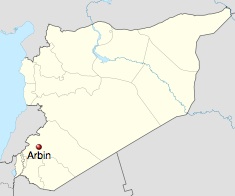A new UN report on the Jobra Incident, an August 21 strike in Syria’s Ghouta area, has concluded that the strike involved a chemical weapon composed of sarin, and fired from an unguided artillery rocket system.
 The report concluded that the strikes were fired from northwest of Ghouta, meaning the strike originated in the direction of the contested, but mostly rebel-held suburb of Arbin, and not Damascus itself. They speculated that the rockets were launched by some variant of the old BM-14 Soviet-made rocket launcher, which Syria’s military acquired in large numbers in the 1960’s.
The report concluded that the strikes were fired from northwest of Ghouta, meaning the strike originated in the direction of the contested, but mostly rebel-held suburb of Arbin, and not Damascus itself. They speculated that the rockets were launched by some variant of the old BM-14 Soviet-made rocket launcher, which Syria’s military acquired in large numbers in the 1960’s.
The report makes no attempt to assign blame for the attack, and rebel factions are also believed to have some capability to produce sarin, with some of the Islamist factions releasing videos bragging of their ability to produce such weapons.
The report was followed up by a separate news conference by the UN Commission of Inquiry on human rights violations in the ongoing civil war, saying there were 14 “potential” chemical weapons attacks since the conflict began.
The chairman of the commission, Paulo Pinheiro, declined to offer any details on those putative attacks, however, saying “we don’t have to share where, or when, or what moment.”
The use of chemical weapons is a war crime per the 1925 Geneva Protocol, though realistically they are just one of a myriad of war crimes committed by both sides in this ongoing war.


